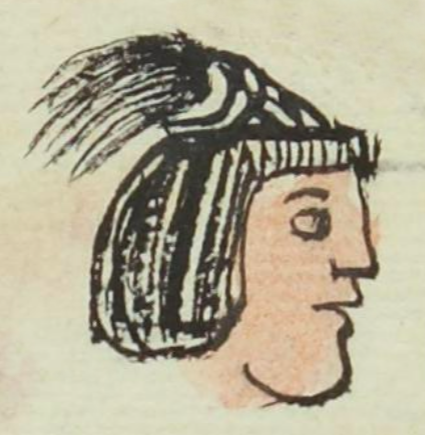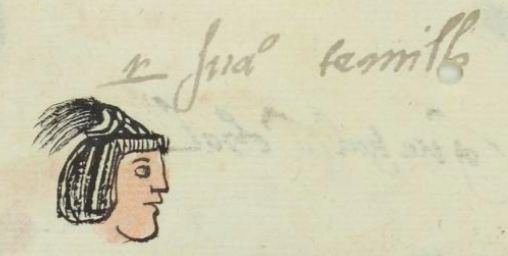Temilo (MH513v)
This simplex glyph of a warrior hairstyle (temilotli) shows the man with the name Temilo wearing such a hairstyle. He is shown in profile view, facing toward the viewer's right. Unusual for the Matrícula de Huexotzinco, the man's face is painted a flesh tone. On top of his head is a clump of hair that is tied in the way reminiscent of the tzontli glyph. The tie might be a natural leather (not obivously died red, as they sometimes are).
Stephanie Wood
Two other examples of glyphs for the name Temilo, both showing stones (phonetic indicators that the name starts with Te-) with a protrusion that is reminiscent of the angle of the hairstyle, tzontli going off above the head, appear below. The curving tzontli going off the top of the head is somewhat reminiscent of the way corn silk bends over from the top of a cob of corn (see below). This glyph, involving the hairstyle itself, does not include phoneticism. But another Temilo from the MH shows the base of a column, pointing to the term temimilli (as suggested by Alfonso Lacadena, 2018, 85), meaning "round stone column." This is another, completely different approach to the name Temilo, removed considerably from the warrior hairstyle, but still within scribal discretionary leeway. Temimilli is a phonetic clue to the name Temilo.
The name Temilo deserves further research. A folklore character named Temilo was associated with Mount Tlaloc and was said--in a twenty-first-century ethnographic retelling--to represent the "devil" and have a role in the construction of the cathedral in Puebla. [See: Jay Sokolovsky, Indigenous Mexico Engages the 21st Century, 2016, p. 151.]
A don Pedro Temilo (also called Temilotzin, in the reverential) was the first governor of Tlatelolco after the Spanish seized power. [See Justyna Olko, Insignia of Rank in the Nahua World, 1992, p. 210.] Miguel León-Portilla (Fifteen Poets of the Aztec World, 2000, ch. 9) relates that Temilotzin is especially known for trying to defend the Mexica capital against the Spanish invasion. He held the military rank of tlatecatl, and he fought alongside Cuauhtemoc.
Stephanie Wood
Juao temillo
Juan Temilo
Stephanie Wood
1560
Jeff Haskett-Wood
hair, pelo, cabellos, guerreros

temilo(tli), warrior hairstyle, https://nahuatl.wired-humanities.org/content/temilotli
posiblemente, Peinado de Guerrero
Stephanie Wood
Matrícula de Huexotzinco, folio 513v, World Digital Library, https://www.loc.gov/resource/gdcwdl.wdl_15282/?sp=106&st=image
This manuscript is hosted by the Library of Congress and the World Digital Library; used here with the Creative Commons, “Attribution-NonCommercial-ShareAlike 3.0 License” (CC-BY-NC-SAq 3.0).













